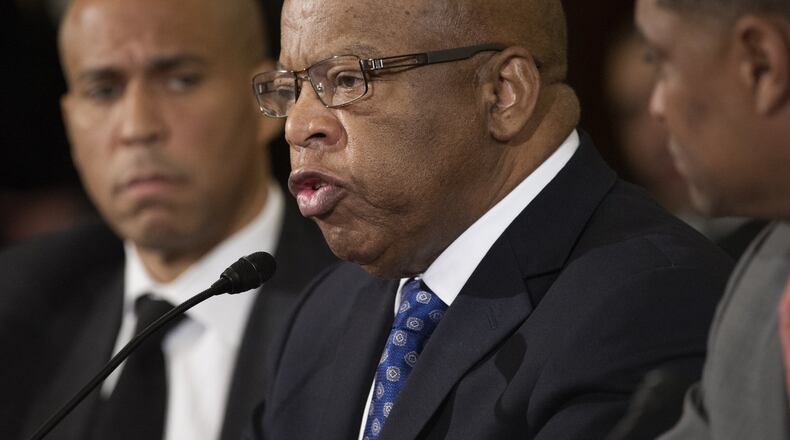U.S. Rep. John Lewis, D-Atlanta, urged senators Wednesday to reject U.S. Sen. Jeff Sessions’ nomination for attorney general, offering a searing rebuke of the “law and order” views long championed by the Alabama Republican and reinjecting the issues of race and civil rights into the final day of Sessions’ marathon confirmation hearing.
Meanwhile, another Georgian vouched for Sessions and his civil rights record before the Senate Judiciary Committee. Former U.S. Deputy Attorney General Larry Thompson, made the case that Sessions’ background in public service would serve him well as the government’s top prosecutor.
Lewis kicked off his testimony Wednesday telling senators about his childhood in segregated Troy, Ala., less than 100 miles and a world away from Hybart, the small farming community where Sessions came of age.
Back then, the civil rights icon said, “the rule of law was used to violate the human and civil rights of the poor, the dispossessed, people of color.”
“Those who are committed to equal justice in our society wonder whether Senator Sessions’ call for ‘law and order’ will mean today what it meant in Alabama when I was coming up back then,” Lewis said.
He said senators, who appear on track to greenlight Sessions’ nomination in the weeks ahead, should not be deceived by “how Senator Sessions may smile, how friendly he may be.”
“We need someone as attorney general who’s going to look out for all of us and not just for some of us,” said Lewis, who rose to prominence in the 1960s as the head of the Student Nonviolent Coordinating Committee.
Lewis was one of several Congressional Black Caucus members to testify against Sessions during the second day of the Republican’s confirmation hearing.
Ten minutes before the cameras trained themselves on Lewis, U.S. Sen. Cory Booker, D-N.J., took the unprecedented step of testifying against a fellow senator.
Booker said the “arc of the universe does not just naturally curve toward justice, we must bend it,” and the country needs an attorney general who is determined to do that.
“Senator Sessions’ record does not speak to that desire, intention or will,” Booker said, noting the Republican’s opposition to overhauling the criminal justice system and his positions on other issues affecting minority groups.
During testimony Tuesday, Sessions sharply denied Democratic characterizations of his record on civil rights and race as being less than stellar, calling them “damnably false.”
“I know we need to do better, we can never go back,” Sessions said. “I am totally committed to maintaining the freedom and equality that this country has to provide to every citizen, I can assure you.”
Not all the witnesses before the committee on Wednesday spoke ill of Sessions.
Thompson, who is African-American and currently teaches corporate law at the University of Georgia, spoke of meeting Sessions more than three decades ago and being touched by the Republican’s past comments on the foot soldiers of the civil rights movement.
“Senator Sessions’ entire life in the arena of public service reflects these key characteristics of fair play and humility,” Thompson wrote in his testimony to the committee. “While being battered at times, he has worked hard, always with an eye to advancing the public good — and he has succeeded.”
Former U.S. Attorney General Michael Mukasey also backed Sessions, writing that “of all the insidious practices that have crept into our politics in recent times, I know of none more insidious than casual and unjustified accusations of racism, smears that once leveled are difficult to wipe clean.”
Indeed, race was never far from the forefront during Wednesday’s hearing.
Democrats pointed to a 1986 letter released Tuesday from the late Coretta Scott King in which the widow of the Rev. Martin Luther King said Sessions should be blocked from a federal judgeship position. (The Senate later rejected him for the post.)
Democrats also complained about committee Chairman Chuck Grassley’s decision to schedule the testimony of Booker, Lewis and other black witnesses at the end of the hearing, a move that breaks with custom.
U.S. Rep. Cedric Richmond, the chairman of the Congressional Black Caucus, who testified alongside Lewis and Booker, said the move was akin to being made to go to the “back of the bus,” a reference to 1960s segregation laws.
Senate Republicans appeared unmoved by critics’ testimony at the end of the day.
"John Lewis was a personal hero to me as a kid. It's still true today," Republican U.S. Sen. Ben Sasse of Nebraska tweeted. "But he didn't offer any evidence today that Sen Sessions is a racist."
About the Author
Keep Reading
The Latest
Featured




